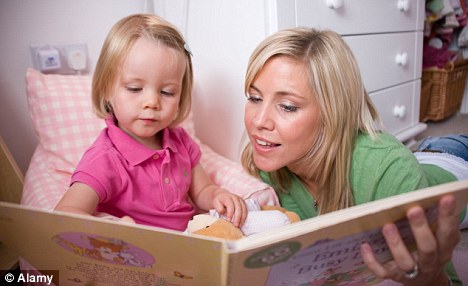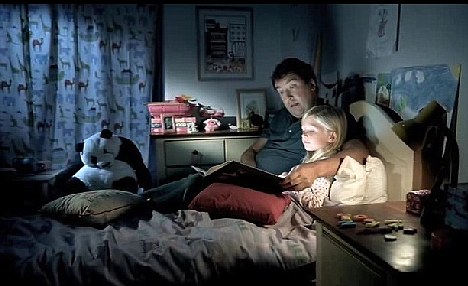
A sad ending for the children’s bedtime story: Declining attention spans mean they could become a thing of the past
Laura Calrk
Bedtime stories are dying out as children’s attention spans shrink, a survey found today.
A declining ability to concentrate is threatening children’s enjoyment of reading, according to a poll of teachers and parents.
One in four parents of young children admit they never read a bedtime story or only do so once every six months.

Bedtime stories are becoming a thing of the past, as children are choosing computers and TV instead of books
Parents report that their children are more interested in screen-based activities such as watching TV, playing computer games and surfing the web.
Teachers say that growing claims on children’s attention are undermining their ability to concentrate for long periods.
Ninety-one per cent of teachers polled said children’s attention spans were shorter than ever before in the classroom.
Almost all teachers said parents needed to do more to encourage reading at home.
The findings, based on a poll of 410 English teachers and 2,000 parents of children aged between two and 11, will fuel concerns that children are losing their love of reading.
Research earlier this year found that a generation of children who have grown up with video games and the internet believe reading is not ‘cool’ and would be embarrassed to be seen with a book by a friend.
The latest findings claim that children are spending three times as much time in front of screens, including the TV, games console and internet, as they do reading.
Only half of parents said they read to their children every day.
Some 17 per cent said they never read bedtime stories and eight per cent said they do every six months or less.

A new survey has revealed 42 per cent of parents said they only read bedtime stories once a week or less
More than four in 10 - 42 per cent - said they only read bedtime stories once a week or less.
The survey also showed that a fifth of parents waited until their child was at least two years old before reading their first book to them.
The findings were released by publishing and education giant Pearson, which is running a national ‘Enjoy Reading’ campaign aimed at inspiring an early and life-long love of reading in children.
Rod Bristow, president of Pearson, said: ‘Study after study has shown that reading for pleasure is a key indicator of future success for children, but demands on children’s attention and the difficulty of inspiring reluctant readers mean many are missing out.’
Research by the National Literacy Trust earlier this year found that that only 33.5 per cent of youngsters reading was ‘cool’ - and only 14 per cent of boys aged 14 to 16.
Some 17 per cent admitted they would be ‘embarrassed if my friends saw me read’.
Children were found to be reading fewer books, comics, magazines and even websites than seven years ago, prompting the charity to warn of a ‘worrying shift’ in reading habits.
But the study said it was ‘essential’ for children to make time to read because children who read outside lessons do better in exams.
Young people who read outside class on a daily basis were 13 times more likely to read above the expected level for their age.
